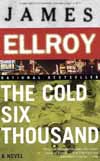 The long awaited sequel to American Tabloid finally appeared in 2001. Austin was one of the fortunate cities on James Ellroy’s last book tour to promote it so I scored an autographed copy. If you read Tabloid, then you remember our anti-heroes Pierre “Big Pete” Bondurant and Ward Littell and how the story ended with the assassination of President Kennedy. The Cold Six Thousand picks up the saga of Ellroy’s Secret History of America Trilogy several hours after the killing with the introduction of his newest troika character, Wayne Tedrow, Jr.
The long awaited sequel to American Tabloid finally appeared in 2001. Austin was one of the fortunate cities on James Ellroy’s last book tour to promote it so I scored an autographed copy. If you read Tabloid, then you remember our anti-heroes Pierre “Big Pete” Bondurant and Ward Littell and how the story ended with the assassination of President Kennedy. The Cold Six Thousand picks up the saga of Ellroy’s Secret History of America Trilogy several hours after the killing with the introduction of his newest troika character, Wayne Tedrow, Jr.
Wayne is one of the few Las Vegas cops not on the take but he remains on the force because his father has clout as the area’s most powerful racist Mormon leader. And when you are a White cop married to a Black woman in the early Sixties, you need powerful connections to protect you. Wayne is much like what Ward (and Exley) used to be‚ conflicted over doing what is right, moral and just, but he’s tainted by the company he keeps. When 6000 begins, he is arriving in Dallas to kill a pimp who knifed a blackjack dealer and he already received his six thousand-dollar payment in advance (more like it was thrust upon him), so there is no turning back on this. The roller coaster then takes off from there since Littell is in Dallas under orders from Hoover to obstruct the Kennedy-Oswald investigations and Big Pete was sent by the Outfit to eliminate a prostitute who slept with the actual shooter. As the plot thickens, Dallas is replaced by Las Vegas, Los Angeles, Vietnam and some parts of the Deep South.
Pete continues his easy-money scheming ways and does an occasional murder on the side but he knows he’s getting too old for this profession. He worries about the Outfit inevitably whacking him. Ward tries to redeem himself by playing a dangerous game of working for Hoover and the Outfit while aiding the Civil Rights Movement. He hopes these good deeds on the sly will make Robert Kennedy forgive him after their falling out in Tabloid. Wayne gets sucked into the quagmire through his chemistry degree (manufacturing heroin for the CIA) and his father’s friendship with Hoover. It all coagulates into an ugly mess and concludes several days after the assassination of Robert Kennedy.
As always, one of the heroes dies (you will have to read it to see which, for those of you who read White Jazz, you know who lives) and all of their moral compasses are wrecked, not like Pete had one. Once again, you are left wanting more and curious about how will this all end. Ellroy stated it will be some point during the Vietnam War. My personal guess would be when America’s direct involvement concluded in 1973.
The pace is brisk. The language is still not for the faint or PC of heart. The horrors Ellroy describes makes Carl Hiaasen’s books look like the Hardy Boys (do not get me wrong though, Carl rocks). You might want something to settle your upset stomach after the sections on the Vietnam excursions.
Going to his book signing was a great experience and it helped clarify the nature of Ellroy’s writings too. When he reads his material, he reads like a beatnik poet (Edward Albee came to mind) and that might be why his writing is punctuated throughout with short sentences. His Secret History of America Trilogy is not meant to be factual neither. During the Q&A he explained how he employs two research assistants. He asks them to gather everything factually known about the historical figures and then he writes 180 degrees away from this. However, this is not completely true since he peppers the current book with the actual incidents of Martin Luther King’s infidelities being filmed and taped by FBI agents (MLK frequently cheating on his wife has been admitted by the King family and other associates). Again, the bulk of the story is fiction or as Ellroy likes to call it, historical fiction. He does not claim this as his own conspiracy theories or remotely true. He does have his own opinions about who killed JFK (the Mafia), but overall Ellroy says his books are fiction and should be interpeted as such. Regarding the racist dialog between his characters, he said he is trying to accurately portray the attitudes and essence of what life was like then. Ellroy himself professes not to share those feelings and even stated at the book signing he considers Martin Luther King to be the bravest man of the 20th century.
